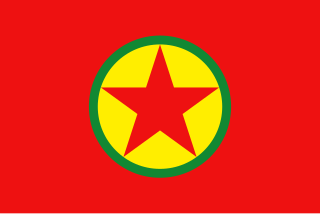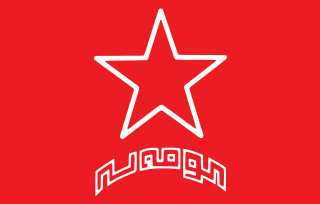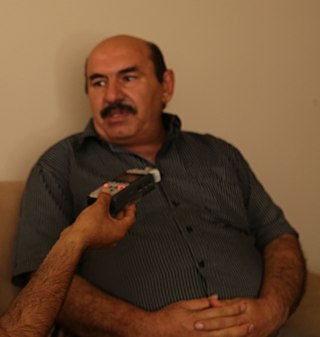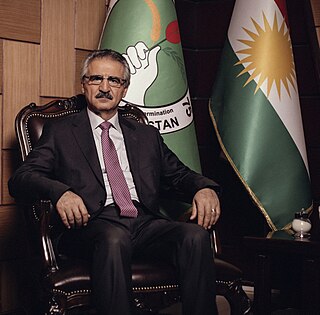Related Research Articles

The Kurdistan Workers' Party or PKK is a Kurdish militant political organization and armed guerrilla movement which historically operated throughout Kurdistan but is now primarily based in the mountainous Kurdish-majority regions of southeastern Turkey and northern Iraq. Since 1984, the PKK has been involved in asymmetric warfare in the Kurdish–Turkish conflict. Although the PKK initially sought an independent Kurdish state, in the 1990s its goals changed to seeking autonomy and increased political and cultural rights for Kurds within Turkey.

Abdullah Öcalan, also known as Apo, is a political prisoner and founding member of the militant Kurdistan Workers' Party (PKK).

Ansar al-Islam in Kurdistan, simply called Ansar al-Islam, is a Kurdish Islamist militant and separatist group. It was established in northern Iraq around the Kurdistan Region by Kurdish Islamists who were former Taliban and former Al-Qaeda volunteers, which were coming back from Afghanistan in 2001 after the Fall of Kabul. Its motive is to establish an Islamic state around the Kurdistan region and to protect Kurdish people from other armed insurgent groups. It imposed strict Sharia in villages it controlled around Byara near the Iranian border.

Human rights in post-invasion Iraq have been the subject of concerns and controversies since the 2003 U.S. invasion. Concerns have been expressed about conduct by insurgents, the U.S.-led coalition forces and the Iraqi government. The U.S. is investigating several allegations of violations of international and internal standards of conduct in isolated incidents by its own forces and contractors. The UK is also conducting investigations of alleged human rights abuses by its forces. War crime tribunals and criminal prosecution of the numerous crimes by insurgents are likely years away. In late February 2009, the U.S. State Department released a report on the human rights situation in Iraq, looking back on the prior year (2008).

The Komala Party of Iranian Kurdistan, commonly shortened to Komalah, is a social-democratic ethnic party of Kurds in Iran. Formerly with Marxist-Leninist and communist ties, the Komalah is a well established party with a history of more than five decades. The Komala party's headquarters are presently in the Kurdistan Region of Iraq. They have an armed wing that has a history of leading the Kurdish resistance. The Komalah was advocated for anti-imperialism and Kurdish self-determination.

The Communist Party of Kurdistan – Iraq is a Kurdish political party, formed in 1993 when the Iraqi Communist Party branch in the Kurdish areas was formed into a separate party. The party is led by Kawa Mahmud.

Kurdistan Region is an autonomous administrative entity within the Republic of Iraq. It comprises four Kurdish-majority divisions of Arab-majority Iraq: the Erbil Governorate, the Sulaymaniyah Governorate, the Duhok Governorate, and Halabja Governorate. The KRI is bordered by Iran to the east, by Turkey to the north, and by Syria to the west. It does not govern all of Iraqi Kurdistan, and lays claim to the disputed territories of northern Iraq; these territories have a predominantly non-Arab population and were subject to the Ba'athist Arabization campaigns throughout the late 20th century. Though the KRI's autonomy was realized in 1992, one year after Iraq's defeat in the Gulf War, these northern territories remain contested between the Kurdistan Regional Government and the Government of Iraq to the present day. In light of the dispute, the KRI's constitution declares the city of Kirkuk as the capital of Iraqi Kurdistan. However, the KRI does not control Kirkuk, and the Kurdistan Region Parliament is based in Erbil. In 2014, when the Syria-based Islamic State began their Northern Iraq offensive and invaded the country, the Iraqi Armed Forces retreated from most of the disputed territories. The KRI's Peshmerga then entered and took control of them for the duration of the War in Iraq (2013–2017). In October 2017, following the defeat of the Islamic State, the Iraqi Armed Forces attacked the Peshmerga and reasserted control over the disputed territories.
Kurdish women have traditionally played important roles in Kurdish society and politics. In general, Kurdish women's rights and equality have improved dramatically in the 21st century due to progressive movements within Kurdish society. However, despite the progress, Kurdish and international women's rights organizations still report problems related to gender inequality, forced marriages, honor killings, and in Iraqi Kurdistan, female genital mutilation (FGM).
Religion in Iraq dates back to Ancient Mesopotamia, particularly Sumer, Akkad, Assyria and Babylonia between circa 3500 BC and 400 AD, after which they largely gave way to Syriac Christianity and later to Islam.

Masoud Barzani is a Kurdish politician who has been leader of the Kurdistan Democratic Party (KDP) since 1979, and was President of the Kurdistan Region of Iraq from 2005 to 2017.

Osman Öcalan was a Kurdish militant and ex-commander of the Kurdistan Workers' Party.

The Kurdistan Communities Union is a Kurdish political organization committed to implementing Abdullah Öcalan's ideology of democratic confederalism. The KCK also serves as an umbrella group for several confederalist political parties of Kurdistan, including the Kurdish militant political organization and armed guerrilla movement Kurdistan Workers' Party (PKK), Democratic Union Party (PYD), Kurdistan Free Life Party (PJAK), and Kurdistan Democratic Solution Party (PÇDK). Finland and Sweden's alleged support for the KCK, is one of the points which caused Turkey to oppose Finland and Sweden's NATO accession bid.

Hikmat Muhammad Karim, known as Mala Bakhtiyar or Mala Bakhtiar, is a political leader and a Senior Iraqi Kurdish politician. He is a commander and General of the Kurdish PUK Peshmerga forces and is considered one of the most powerful people in Iraq. Mala Bakhtiar is the former chief of the Executive Bureau of the Patriotic Union of Kurdistan. He is now the Joint leader of the Supreme political council of the Patriotic Union of Kurdistan (PUK), alongside Kosrat Rasul Ali.
The 2011–2012 Kurdish protests in Turkey were protests in Turkey, led by the Peace and Democracy Party (BDP), against restrictions of Kurdish rights by of the country's Kurdish minority's rights. Although they were the latest in a long series of protest actions by Kurds in Turkey, they were strongly influenced by the concurrent popular protests throughout the Middle East and North Africa, and the Turkish publication Hürriyet Daily News has suggested that the popularly dubbed "Arab Spring" that has seen revolutions in Egypt and Tunisia may lead to a "Kurdish Summer" in the northern reaches of the Middle East. Protesters have taken to the streets both in Istanbul and in southeast Turkey, with some demonstrations also reported as far west in Anatolia as İzmir.

The Democratic Union Party is a Kurdish left-wing political party established on 20 September 2003 in northern Syria. It is a founding member of the National Coordination Body for Democratic Change. It is the leading political party among Syrian Kurds. The PYD was established as a Syrian branch of the Kurdistan Workers Party (PKK) in 2003, and both organizations are still closely affiliated through the Kurdistan Communities Union (KCK).

The Women's Protection Units or Women's Defense Units is an all-female militia involved in the Syrian civil war. The YPJ is part of the Syrian Democratic Forces, the armed forces of Rojava, and is closely affiliated with the male-led YPG. While the YPJ is mainly made up of Kurds, it also includes women from other ethnic groups in Northern Syria.

Jineology is a form of feminism and of gender equality advocated by Abdullah Öcalan, the representative leader of the Kurdistan Workers' Party (PKK) and the broader Kurdistan Communities Union (KCK) umbrella. From the background of honor-based religious and tribal rules that confine women in Middle East societies, Öcalan said that "a country can't be free unless the women are free", and that the level of women's freedom determines the level of freedom in society at large.
Kurdish-Islamic synthesis, or Kurdish-Islamic nationalism is a form of Kurdish nationalism which is Islamist in nature, unlike mainstream Kurdish nationalism, which is secularist in nature.

Woman, Life, Freedom is a slogan that originated within the women-led Kurdish movements. This slogan transcended its initial context and garnered global recognition following the 2022 protests in Iran, sparked by the death of Mahsa Amini, who was in custody of Iran’s morality police for “improper” clothing. The phrase rapidly became a universal rallying cry, symbolizing resistance against oppression and the fight for women's rights.
References
- ↑ "Niyaz Abdullah, Iraqi Kurdistan". Committee to Protect Journalists. 1 March 2023. Retrieved 26 May 2024.
- ↑ Scott, Liam; Saleh, Balen (24 November 2023). "Iraqi Kurdish Journalist Dedicates Award to Fellow Reporters". Voice of America. Retrieved 26 May 2024.
- ↑ "Iraqi Kurdish journalist wins International Press Freedom Awards". Arab News. 18 November 2022. Retrieved 26 May 2024.